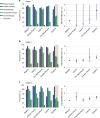Variation in treatment and survival of older patients with non-metastatic breast cancer in five European countries: a population-based cohort study from the EURECCA Breast Cancer Group
- PMID: 29875471
- PMCID: PMC6035184
- DOI: 10.1038/s41416-018-0090-1
Variation in treatment and survival of older patients with non-metastatic breast cancer in five European countries: a population-based cohort study from the EURECCA Breast Cancer Group
Abstract
Background: Older patients are poorly represented in breast cancer research and guidelines do not provide evidence based recommendations for this specific group. We compared treatment strategies and survival outcomes between European countries and assessed whether variance in treatment patterns may be associated with variation in survival.
Methods: Population-based study including patients aged ≥ 70 with non-metastatic BC from cancer registries from the Netherlands, Belgium, Ireland, England and Greater Poland. Proportions of local and systemic treatments, five-year relative survival and relative excess risks (RER) between countries were calculated.
Results: In total, 236,015 patients were included. The proportion of stage I BC receiving endocrine therapy ranged from 19.6% (Netherlands) to 84.6% (Belgium). The proportion of stage III BC receiving no breast surgery varied between 22.0% (Belgium) and 50.8% (Ireland). For stage I BC, relative survival was lower in England compared with Belgium (RER 2.96, 95%CI 1.30-6.72, P < .001). For stage III BC, England, Ireland and Greater Poland showed significantly worse relative survival compared with Belgium.
Conclusions: There is substantial variation in treatment strategies and survival outcomes in elderly with BC in Europe. For early-stage BC, we observed large variation in endocrine therapy but no variation in relative survival, suggesting potential overtreatment. For advanced BC, we observed higher survival in countries with lower proportions of omission of surgery, suggesting potential undertreatment.
Conflict of interest statement
The authors declare that they have no conflict of interest.
Figures



References
-
- DeSantis CE, Fedewa SA, Goding Sauer A, Kramer JL, Smith RA, Jemal A. Breast cancer statistics, 2015: Convergence of incidence rates between black and white women. CA Cancer J. Clin. 66, 31–42 (2016). - PubMed
-
- Biganzoli L, Wildiers H, Oakman C, Marotti L, Loibl S, Kunkler I, et al. Management of elderly patients with breast cancer: updated recommendations of the International Society of Geriatric Oncology (SIOG) and European Society of Breast Cancer Specialists (EUSOMA) Lancet Oncol. 2012;13:e148–e60. doi: 10.1016/S1470-2045(11)70383-7. - DOI - PubMed
-
- Hurria A, Levit LA, Dale W, Mohile SG, Muss HB, Fehrenbacher L et al. Improving the evidence base for treating older adults with cancer: american society of clinical oncology statement. J. Clin. Oncol.33, 3826–e33 (2015). - PubMed
-
- van de Water W, Kiderlen M, Bastiaannet E, Siesling S, Westendorp R, van de Velde C et al. External validity of a trial comprising elderly patients with hormone-receptor positive breast cancer. J. Natl. Cancer Inst.106, dju051 (2014). - PubMed
-
- Wildiers H, Mauer M, Pallis A, Hurria A, Mohile SG, Luciani A, et al. End points and trial design in geriatric oncology research: a joint European organisation for research and treatment of cancer-alliance for clinical trials in oncology-international society of geriatric oncology position article. J .Clin. Oncol. 2013;31:3711–3718. doi: 10.1200/JCO.2013.49.6125. - DOI - PubMed
Publication types
MeSH terms
Grants and funding
LinkOut - more resources
Full Text Sources
Other Literature Sources
Medical

